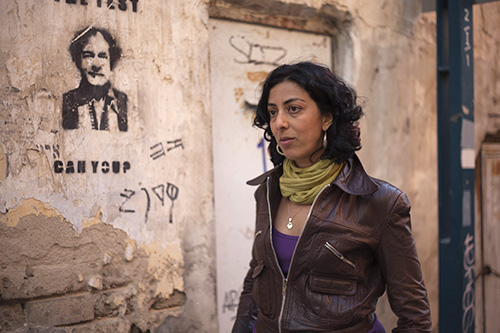
Ayelet Tsabari was heading to her mother’s home in Tel Aviv for dinner last month when the phone rang. The caller was from the Jewish Book Council in the United States and said she had good news for the Canadian writer, who had been shortlisted for the 2015 Sami Rohr Prize for Jewish Literature.
Tsabari’s first thought was: “Oh, it’s so great, I’m the runner-up. She told me I won, and I managed to mishear her and still thought I was the runner-up.”
Eventually the message sank in. She had won the overall prize, worth $100,000. The award alternates annually between emerging fiction and non-fiction writers and recognizes works that “explore the Jewish experience.”
Tsabari won for her debut short story collection The Best Place on Earth, published in 2013. She wrote most of the stories in the collection as her thesis project for U of G’s master of fine arts in creative writing program.
The runner-up is Canadian Kenneth Bonert for his novel The Lion Seeker.
“I’m still a bit out of words,” says Tsabari of the win. “It’s amazing. It’s changed everything for me.”
It’s also a win for the Mizrahi – or Arab Jew – characters in her stories. She wrote the stories partly to give a voice to what she calls a largely overlooked population that she belonged to while growing up in Tel Aviv.
She’s still pursuing that theme of giving voice to overlooked groups.
When she received the news about the Sami Rohr prize, Tsabari was in Israel on a Chalmers fellowship from the Ontario Arts Council. She’s interviewing Jewish Yemeni women to learn about their stories, dances and songs.
“They sing and I get tears in my eyes. There’s a collective memory or something dormant inside me that responds to that,” says Tsabari, whose grandparents emigrated from Yemen to settle in Israel.
In Yemen, orphaned girls were often married as young teenagers and forced to convert to Islam. Tsabari spoke to one woman who was married at 15 and kept running away until the government placed her under house arrest.
Referring to these “runaway brides,” she says, “I’ve thought of these women as lacking rights and imagined them as submissive. Obviously, running away is a very gutsy thing to do. That really sparked something in my imagination.”
Many Yemeni women moved to Israel with their families between the 1930s and 1950s. She’s collecting their stories to better understand their oral traditions and rituals, and ultimately to weave those untold narratives in her writing.
Now 41, Tsabari grew up in Israel and travelled in Southeast Asia and North America before moving to Canada in 1998. She lives in Toronto with her husband and their two-year-old daughter.
She has taught certificate writing courses at U of G and at the University of Toronto.
Her grandmother’s death a few years ago sparked Tsabari’s interest in her roots. Another trigger was becoming a mother herself. “I have a feeling like a hunger to be able to pass on some of those traditions or stories,” she says.
She’s now writing a memoir tentatively called Missing in Action.
Calling herself “an exile of choice,” she says she appreciates Canada even as she feels a tug toward the heritage and culture of Israel. “Even writing about Israel is a way back. That’s the trajectory. Leaving and returning: it’s a very Jewish theme.”
Tsabari will appear among Sami Rohr prize finalists at the Museum of Jewish Heritage in New York City in May.